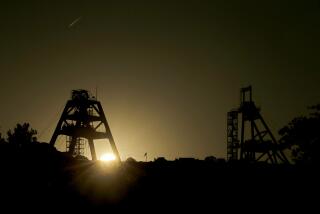Mining royalties could generate millions for U.S., if collected
- Share via
WASHINGTON — Because of a law passed during the presidency of Ulysses S. Grant, the federal government does not collect royalties from gold, silver, copper and other minerals extracted from public land, a source of revenue that could potentially generate hundreds of millions of dollars for the federal budget, government auditors reported Wednesday.
Although the government collects billions of dollars in royalties from fossil fuels extracted from federal lands and waters, it does not even collect information from hard-rock mine operators about the amount or value of the minerals they take from public land because there are no royalty requirements, according to the report by the Government Accountability Office.
The report was undertaken at the request of Rep. Raul M. Grijalva (D-Ariz.) and Sen. Mark Udall (D-Colo.). Grijalva is cosponsor of a House bill that would set a 12.5% royalty rate on hard-rock minerals.
“There’s a simple legislative fix for this big hole in the federal government’s revenue stream, and it’s only fair that companies benefiting from access to public lands pay their fair share,” Grijalva said. “Congress should make sure disclosure is a priority, and then we can talk about how to make sure the American people financially benefit from the sale of public minerals the way they should have been all along.”
The Mining Law of 1872 was passed during the Grant administration to encourage settlement of Western states by prospectors. Efforts to reform the law over the last 140 years have been blocked by politicians from Western states and the mining industry.
Hard-rock mining companies pay only a few hundred dollars to register and maintain their claim on the land. According to the GAO report, the Interior Department estimated the sales value of hard-rock minerals from federal land to be about $6.41 billion in fiscal year 2011, but there is no way to know for certain.
Luke Popovich, a spokesman for the National Mining Assn., said the industry did not oppose “royalties on hard-rock minerals either, provided they don’t harm the competitiveness of our industry and fairly weigh the input costs of mining here in the resource-rich but high-cost U.S.”
More to Read
Sign up for Essential California
The most important California stories and recommendations in your inbox every morning.
You may occasionally receive promotional content from the Los Angeles Times.











